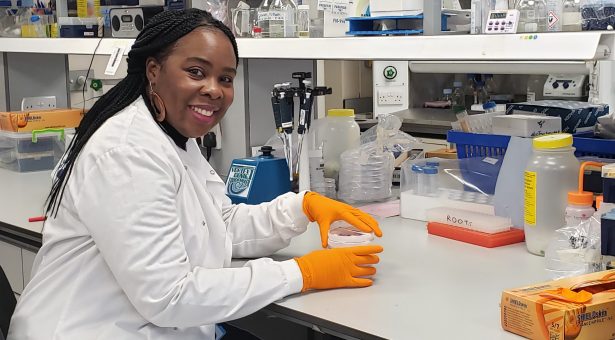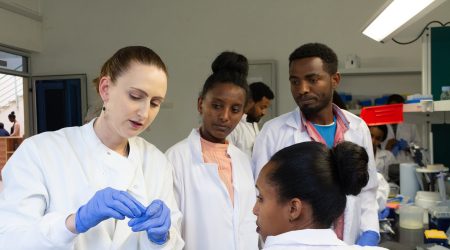Yellow rust, wheat and me; Introducing Dr Carol Ibe

Dr Carol Ibe is a Postdoctoral Scientist in Dr Diane Saunders lab, working on yellow rust in wheat.
Wheat is a major staple cereal for 40% of the world’s population and is important for food security, especially in less developed countries which harvest 50% of global wheat production.
We asked Carol, what is yellow rust, why is it a problem and what can we do to save our daily bread?
“Yellow rust is a disease caused by the biotrophic fungal pathogen Puccinia striiformis f. sp. tritici (Pst), a wheat destroyer and a major threat to wheat production worldwide.
My work involves investigating the role of wheat genes that are involved in yellow rust disease susceptibility.
By understanding the role of specific wheat genes in enhancing or restricting yellow rust in the crop, we may be able to contribute to the development of new forms of disease resistance in wheat, which will significantly reduce global wheat yield losses, and enhance its production to meet the ever-increasing demand for food.
I am originally from Nigeria, so I know how urgent the need to sustainably increase global wheat production is, particularly in developing countries, where hunger and malnutrition continue to affect millions of lives.
My scientific curiosity and passion to improve food security inspired me to work on this exciting project in Dr Diane Saunders Lab.
Prior to joining the Saunders Lab, I completed my PhD in Plant Sciences at the University of Cambridge as a Gates scholar.
My research focused on identifying common accommodation mechanisms for both mutualistic (Rhizophagus irregularis) and detrimental (Magnaporthe oryzae) fungi in rice roots.
I uncovered a novel function of rice plasma membrane receptors in enabling M. oryzae invasion of rice roots, supporting the long-standing hypothesis that plant pathogens exploit genetic pathways established in the ancient arbuscular mycorrhizal symbiosis to facilitate their invasion of the host plant.
After submitting my PhD thesis, I spent three months working with the University of Cambridge’s Cambridge-Africa Programme, where I designed a Postdoctoral Research Fellowship Scheme that will support exceptional African early-career researchers to undertake cutting-edge research (at the University of Cambridge) that addresses Africa’s challenges and the Sustainable Development Goals (SDGs).
This project came as a natural fit and follow-on to the capacity building initiatives that I developed before and during my PhD, including the ‘Reach & Teach Science in Africa’ project and the ‘Bio-innovation for Africa’ pitch challenge.
These initiatives are designed to provide Africa-based agricultural early-career researchers with hands-on laboratory experience, research tools and collaborative opportunities needed to advance research and innovation to address local needs.
Before my PhD, I studied for an MSc in molecular biology at Georgetown University in Washington DC.
I always loved biology, but thought I’d end up as a teacher, because I enjoy teaching and sharing knowledge or a medical doctor, because it would allow me the opportunity to treat and care for people.
I began to study microbiology in Nigeria because I was interested to learn more about human pathogens that cause prevalent and deadly diseases such as malaria and typhoid fever in the country.
However, when I left Nigeria to go to Georgetown, I saw science from a different lens, one that I’d never experienced or imagined considering my educational background.
The access to world-class laboratories and research facilities, tools, expertise, and resources to do science with potential real-life applications inspired me to pursue a career in science.
I enjoy doing exciting and meaningful research because it presents the opportunity for me to make important contributions that can improve the lives of others, and society at large.
As my interests cut across plant biology (plant-microbe interactions and crop genetics), capacity building, and science outreach and engagement, I found the opportunity to work at the John Innes Centre a natural and excellent fit for my career aspiration and passion to advance bioscience education, research and innovation for Africa’s sustainable development.
The John Innes Centre is known globally for strength and expertise in these areas (and more), hence my interest to join and add value to a dynamic research team that is dedicated to safeguarding and enhancing wheat production on a global scale.
Developing more effective measures to curb diseases that affect globally consumed staple cereals can alleviate hunger, malnutrition and extreme poverty, especially in many developing countries. These prospects make the journey very exciting for me, and I am happy to be a part of an excellent team of researchers that are doing impactful work across the globe.”



